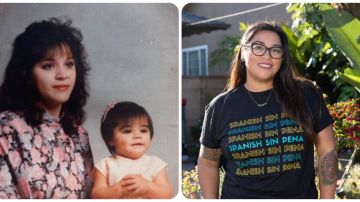Why I’ve Embraced Being a Pocha, Soy De Allá Y De Acá
Growing up as Mexican American meant I was exposed to both English and Spanish at a young age and that meant more work for me depending on who I was talking to

Photos courtesy of Jackie Rodriguez
Growing up as Mexican American meant I was exposed to both English and Spanish at a young age and that meant more work for me depending on who I was talking to. As a chiquilla, I used to get so excited when my Tia Lety would babysit me, and my Tio Mario would come over. He was the only one on that side of the family that spoke English. I felt like I could catch a break from the language barrier that I would struggle with while I was with my Tia. And you know how we all had that one “cool tio”? For me, Tio Mario was that guy.

One day my Tio Mario came home from work and told me a “friend” was coming over and that he didn’t want me to call him Tio in front of her. I didn’t think much about it and just shrugged it off. Later that night, I found out that him and his new friend were in his room. So, in comes me, an 8 year old mocosa, already forgetting everything he told me earlier knocking and yelling at his door, “Tioooo!”
He swung the door open so fast, giving me the biggest stink eye with his brand new blue-eyed contacts, trying to get me away from his door A-S-A-P. La güera he was with giggled in the background as he shoved me out of the way and slammed the door. I was so hurt; he had never treated me like this before. He was supposed to be the “cool” Tio.
I went back to my Tia sad, hurt y confundida. My Tia proceeds to tell me that he was just embarrassed of us and wanted to impress la gringa. At the time, I couldn’t fully understand how pretending we weren’t his family would impress her.
Was it because we didn’t have a big house? Was it because we were Mexican? Was it because we were brown? Even though he had those blue-eyed contacts on, he couldn’t hide who he was. Did he think he was better than our family because he spoke English?
That was the first time I remember feeling shame, feeling pena. Was our family something to be embarrassed about? Should I not learn Spanish? If my “cool” Tio was acting this way, what was I missing?

Two years later, I remember sitting on the floor in my Abuela’s sala watching Selena. It is the first time I heard Abraham Quintanilla shout his infamous line, “Being Mexican American is tough… We gotta be more Mexican than the Mexicans, and more American than the Americans, both at the same time. We gotta know about Oprah and Cristina. It’s exhausting!”
At the time, I didn’t understand all that there was to unpack with that line but that question always stuck with me, is it harder being Mexican American? Did this explain what my Tio was going through? Did this explain his shame? I understand now, that it was so much more than that. Tio Mario was going through his own process, caught up in assimilation and finding his own identity as an immigrant himself.
Now, as I reflect on my own process, I ask myself: Is it even harder being a 34 year old POCHA Mexican American? Although I understand Abraham Quintanilla’s point, knowing about both sides IS what I love most about being a Mexican American!
Because when it comes to food, music, art and family traditions it’s the best of both worlds! Except for now, instead of worrying about Oprah and Cristina, I’m over here feeling guilty for cheating on Jorge Ramos with my crush on Trevor Noah!
The exhausting part about being a Pocha is the judgement and shame others try to project onto you and that we put onto ourselves as well. We can get into our own heads as to what a Latinx should and shouldn’t be, especially when it comes to language.
The term pocho/a generally refers to someone who has forgotten or rejected their Mexican heritage and meant to be an isult but lately there’s been more acceptance of this in-between identity. Here’s the thing: I am a PROUD Pocha and, my fellow Pochxs, WE are the ones changing the narrative! I do have Spanish-language goals and I’m working with Spanish Sin Pena on improving my skills, but being a Pocha also represents that I’m trying and that I’m not ashamed! We aren’t rejecting our heritage, we are learning, growing and embracing the dualities of both our culturas.
And, although we are still in the process of exploring different parts of our own identities and our families’ histories, it never makes us any more or less than!
¡Porque soy YO y soy Proud Pocha Por Vida!

















